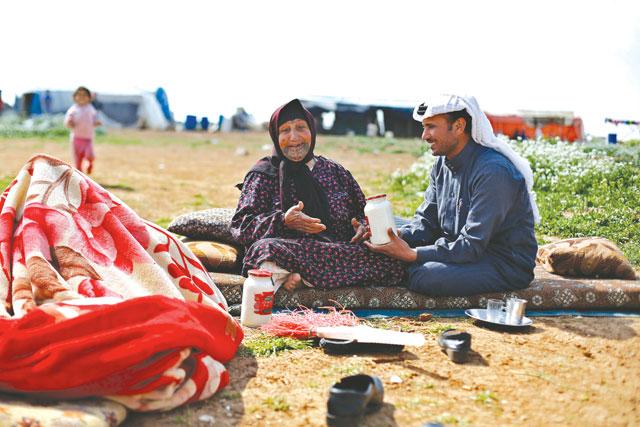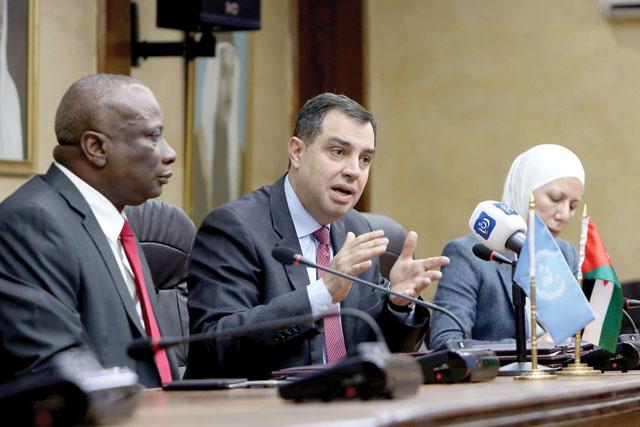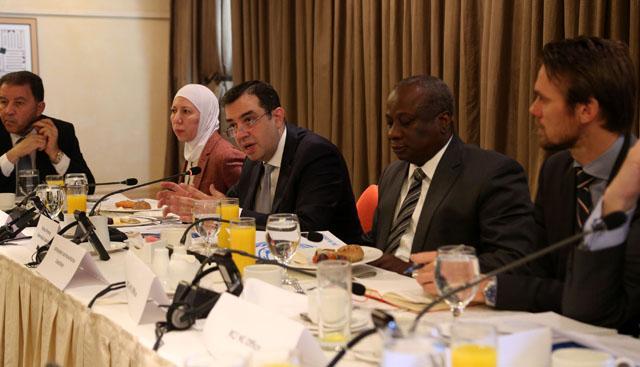You are here
Jordan seeks to handle refugee aid through ‘trust fund’
By Khetam Malkawi - Mar 16,2015 - Last updated at Mar 16,2015

AMMAN — Although Jordan is committed to providing Syrian refugees with every assistance possible, mitigating the negative impact of the crisis comes at a cost as the burden is stretching the country’s resources to the limit, top officials said on Monday.
To date, the Kingdom has received only 5.5 per cent of the $2.9 billion needed this year to sustain services for Syrian refugees and host communities.
“Jordan is fully committed to a peaceful resolution to the crisis in Syria and the security situation must be addressed comprehensively,” Prime Minister Abdullah Ensour said in his remarks at the 7th meeting of the Jordan Response Platform for the Syria Crisis organised by the Ministry of Planning and International Cooperation.
The situation Jordan is facing as a host is unprecedented, according to Ensour.
“Today, Jordan is the world’s third largest host of refugees and the [Syrian] crisis has had a profound impact across the entire country,” he said, adding that the crisis is placing an overwhelming burden on Jordanian people, infrastructure, government services and limited resources. “It is evident that Jordan cannot meet the challenge alone,” he said.
Addressing donors at the two-hour meeting, Minister of Planning and International Cooperation Imad Fakhoury said the meeting came ahead of the “Kuwait III” conference on Syrian refugees, which, he said, is also a “compelling occasion” to make another strong call to all donors to support the plan. Last year, out of $2.3 billion that Jordan requested for humanitarian and resilience needs, only 37 per cent was funded. “This year, only 5.5 per cent of the total funding requested has been secured so far,” Fakhoury said.
The Kingdom this year launched Jordan Response Plan (JRP) that worth $2.9 billion to provide services to Syrian refugees in the country and host communities.
In this regard, Jordan is working to establish a UN trust fund whose agreement is “expected to be signed soon to support our joint efforts towards increased aid coordination and effectiveness in Jordan”, Fakhoury announced.
He added that the planned trust fund “offers the donors who choose to go through this channel a best practice mechanism while we also kept flexibility for donors to implement their support through their own channels if they chose to do so”.
The meeting was also attended by several ministers who took the podium speaking about the impact of hosting Syrian refugees in the Kingdom.
Minister of Interior Hussein Majali said the ministry is doing its utmost to facilitate the work of aid agencies and help them meet their targets.
However, he noted that only 8 per cent of refugees reside in camps while the rest live in host communities, which puts more pressure on the infrastructure.
All sectors in Jordan have been affected by the refugee crisis, Majali said, adding that one of the major problems is the crisis’ impact on employment chances for Jordanians.
According to the UNHCR figures, there are 3.9 million Syrian refugees in host countries.
Figures released by UNHCR this week show that Turkey tops countries that host Syrian refugees with 1,698,472 people, followed by Lebanon with 1,183,109, while Jordan’s Syrian refugee population stands at 625,178.
The rest are in Iraq and Egypt, according to the UN agency.
However, the government said number of Syrians in the Kingdom exceeds 1.4 million, but only less than 50 per cent of them are registered as refugees.
Hazem Nasser, minister of water and irrigation, also called for facilitating funding procedures, as the current mechanism causes delay in the process of receiving funds.
Nasser noted that of the $750 million that the ministry needed in 2013, 2014 and the current year to supply refugees with water and implement sanitation projects, it only received $180 million.
“The crisis is beyond our capabilities and resources,” the minister said.
He explained that Jordan is one of the poorest countries in terms of water resources, and hosting refugees seriously affects the sustainability of the meagre resources available.
Before the crisis, he noted, the per capita water share in the northern region was 110 litres, but it has now dropped to 84 litres.
The social protection services are also strained due to hosting Syrian refugees, according to Reem Abu Hassan, minister of social development.
She noted that one in five Syrians in Jordan is supported by the social safety network.
Abu Hassan called on donors to increase their support for the army and Gendarmerie, and also called on the Arab organisations that provide direct assistance to Syrian refugees to coordinate with the government in this regard.
United Nations Resident-Humanitarian Coordinator to Jordan Edward Kallon called on the international community to stand by Jordan to be able to mitigate the impact of the crisis.
“Jordan continues to face major challenges as a direct consequence of the ongoing crisis in neighbouring Syria,” the UN official said.
He added that the country remains a bastion of regional stability, but national response capacity and traditional humanitarian response infrastructure are at full stretch. “We have all recognised that this is unsustainable, and that a paradigm shift is required in our collective response to this protracted crisis.”
Kallon also stressed that the responsibility of implementing the JRP does not rest solely with the government. “The JRP represents a compact between Jordan and the international community. We must therefore work in close partnership if we want to be successful in our collective endeavour.”
The UN official also commended the idea of establishing the trust fund referred to by Fakhoury, noting that it provides a platform for expanding partnerships, reducing transaction costs and increasing accountability through joint government, UN and donor management.
“I urge donors to consider this as a possible mechanism for contributions and pledges, including at the upcoming 3rd International Humanitarian Pledging Conference for Syria scheduled for March 31 in Kuwait,” he said.
Related Articles
The Planning and International Cooperation Ministry and the UN on Saturday signed a launching agreement of the Jordan Resilience Fund (JRF) as a unified channel for donor contributions against the impact of the Syrian crisis on Jordan.
The Syrian crisis has placed, and continues to place, an overwhelming burden on Jordan, and the Kingdom cannot meet this challenge without the strong engagement and continued generosity of partners, Planning Minister Imad Fakhoury said on Monday.
Only 5.6 per cent of the $2.9 billion Jordan Response Plan (JRP) for the Syrian crisis is currently funded, with $43.3 million approved and $124.4 million pledged, Minister of Planning and International Cooperation Imad Fakhoury said Sunday.













